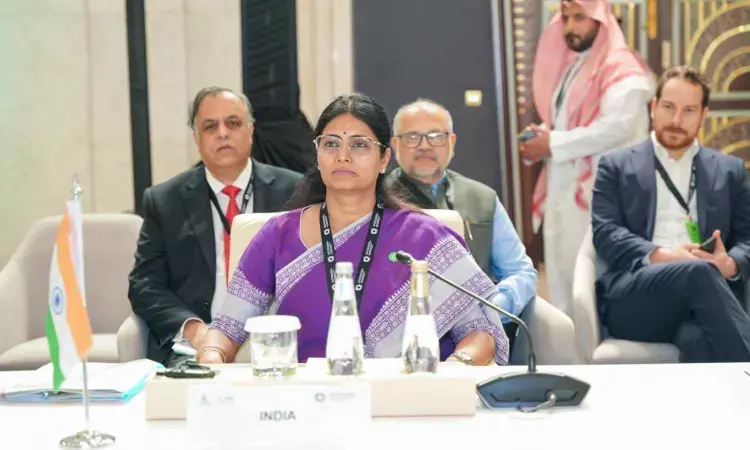- Home
- Medical news & Guidelines
- Anesthesiology
- Cardiology and CTVS
- Critical Care
- Dentistry
- Dermatology
- Diabetes and Endocrinology
- ENT
- Gastroenterology
- Medicine
- Nephrology
- Neurology
- Obstretics-Gynaecology
- Oncology
- Ophthalmology
- Orthopaedics
- Pediatrics-Neonatology
- Psychiatry
- Pulmonology
- Radiology
- Surgery
- Urology
- Laboratory Medicine
- Diet
- Nursing
- Paramedical
- Physiotherapy
- Health news
- Fact Check
- Bone Health Fact Check
- Brain Health Fact Check
- Cancer Related Fact Check
- Child Care Fact Check
- Dental and oral health fact check
- Diabetes and metabolic health fact check
- Diet and Nutrition Fact Check
- Eye and ENT Care Fact Check
- Fitness fact check
- Gut health fact check
- Heart health fact check
- Kidney health fact check
- Medical education fact check
- Men's health fact check
- Respiratory fact check
- Skin and hair care fact check
- Vaccine and Immunization fact check
- Women's health fact check
- AYUSH
- State News
- Andaman and Nicobar Islands
- Andhra Pradesh
- Arunachal Pradesh
- Assam
- Bihar
- Chandigarh
- Chattisgarh
- Dadra and Nagar Haveli
- Daman and Diu
- Delhi
- Goa
- Gujarat
- Haryana
- Himachal Pradesh
- Jammu & Kashmir
- Jharkhand
- Karnataka
- Kerala
- Ladakh
- Lakshadweep
- Madhya Pradesh
- Maharashtra
- Manipur
- Meghalaya
- Mizoram
- Nagaland
- Odisha
- Puducherry
- Punjab
- Rajasthan
- Sikkim
- Tamil Nadu
- Telangana
- Tripura
- Uttar Pradesh
- Uttrakhand
- West Bengal
- Medical Education
- Industry
AMR a global health threat, requires urgent action via one health approach: Anupriya Patel

New Delhi: Union Minister of State for Health and Family Welfare, Anupriya Singh Patel addressed the 4th Ministerial High-level Global Conference on Antimicrobial Resistance (AMR) in Jeddah, Kingdom of Saudi Arabia, .
The theme of the conference was ‘From Declaration to Implementation - Accelerating Actions Through Multisectoral Partnerships for the Containment of AMR’.
Speaking on the occasion, Smt. Patel said, “Antimicrobial Resistance is a global health threat requiring urgent action through ‘One Health’ approach that fosters cooperation across human, animal, and plant health, as well as environmental and other relevant sectors.”
Outlining a set of practical steps to implement the commitments made in the declaration on antimicrobial resistance (AMR), Smt. Patel emphasized the importance of strengthening surveillance, fostering collaboration, and addressing critical barriers to antimicrobial access.
She said, “India proposes a comprehensive approach aimed at improving AMR detection and surveillance capacities across sectors, enabling the use of data to guide evidence-based antimicrobial usage at both local and national levels. This would lay the foundation for the creation of integrated and interoperable surveillance systems across sectors.”
Also Read:Govt efforts reduced TB incidence by 16 per cent, lowered deaths by 18 per cent: Anupriya Patel
India’s proposals include prioritizing sustainable financing and research investments to enhance governance in the fight against AMR, as well as establishing clear accountability frameworks for effective governance. India also supports the creation of the AMR Multi-partner Trust Fund and the establishment of an Independent Panel on Evidence for Action against AMR by the quadripartite organizations in 2025.
Smt. Patel called for increased support to member states in strengthening sectoral and multisectoral collaboration and coordination, particularly through the quadripartite joint secretariat. “India also stresses the importance of addressing barriers to the access and affordability of antimicrobials, diagnostics, and vaccines in developing nations, especially in Low- and Middle-Income Countries (LMICs). One key solution proposed is the establishment of local or regional manufacturing hubs and the strengthening of regulatory mechanisms to ensure equitable access”, she said.
MoS for Health, Anupriya Singh Patel addressed the 4th Ministerial High-level Global Conference on Antimicrobial Resistance in Jeddah, Kingdom of Saudi Arabia
MoS for Health, Anupriya Singh Patel addressed the 4th Ministerial High-level Global Conference on Antimicrobial Resistance in Jeddah, Kingdom of Saudi Arabia
Smt. Patel highlighted the need for capacity building in statistical modeling to calculate baseline rates of AMR-related deaths, helping member states track progress towards the global target of reducing AMR-related deaths by 10% as committed in the UNGA Political Declaration.
She also emphasized that the factors contributing to AMR vary across countries and regions, and therefore, actions must be tailored to the local context to effectively address the challenge. “India remains committed to supporting global efforts in combating AMR while ensuring that solutions are context-specific and sustainable”, she stated.
The ‘Jedda Commitments’ issued at the 4th High-Level Ministerial Conference on AMR resolved to translate the Political Declaration from the UNGA HLM on AMR into practical commitments for urgent action inter alia committing to create national AMR multi-sectoral coordinating bodies respecting the multipronged One-Health challenges.
The coordinating bodies, in the form of National AMR Committees, shall include representatives of all relevant government departments, agencies, appropriate legislative bodies, the private sector and civil society, to fully implement and ensure the funding and monitoring of National Action Plans (NAPs), and to gather accurate data, by harnessing Al advancements within countries, as applicable, and report regularly into global surveillance.
The AMR multisectoral coordinating bodies will help to translate evidence into effective cross-departmental and sectorial policy formulations within Member States.
Also Read:IMA Launches National Alliance of Medical Professionals to Combat Antimicrobial Resistance
Kajal Rajput joined Medical Dialogues as an Correspondent for the Latest Health News Section in 2019. She holds a Bachelor's degree in Arts from University of Delhi. She manly covers all the updates in health news, hospitals, doctors news, government policies and Health Ministry. She can be contacted at editorial@medicaldialogues.in Contact no. 011-43720751


